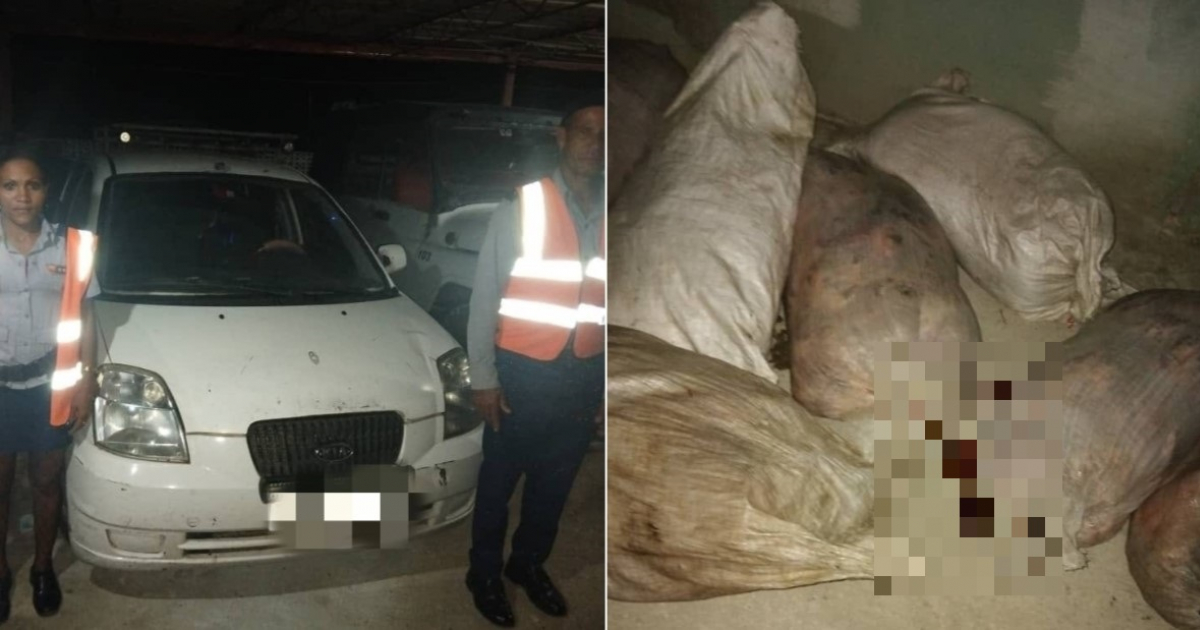
Related videos:
As part of the Cuban regime's campaign against illegal activities, the seizure of 10 sacks of beef in Granma reflects the crackdown on the black market. However, these actions do not address the underlying issue: the lack of access to basic food that drives people to resort to these practices for survival.
According to the official Facebook profile "Héroes de Azul," at the Jucarito checkpoint, located between Granma and Las Tunas, 10 bags of beef were seized from two individuals traveling in a private car.
The report stated that those involved were identified and taken along with the goods to the police unit, where an investigation was launched.
In another post, the official profile reported on another seizure in the province of Granma related to the illegal slaughter of large livestock.
According to the report, officers in patrol car 516, while conducting an operation near the Carlos Manuel de Céspedes Airport, detected a bicitaxi transporting 74 kilograms of beef, consisting of meat, bones, hooves, and ribs. The individual involved was apprehended and taken to the police unit for the relevant investigations.
The Cuban regime identifies the illegal sacrifice of cattle as one of the main factors hindering the development of livestock farming in the country, emphasizing its negative impact on the economy and imposing severe penalties for this crime.
However, this official narrative overlooks the roots of the problem: decades of failed economic policies and a system that stifles agricultural and livestock producers.
The severity with which the sacrifice of livestock is penalized contrasts sharply with the lack of effective solutions to ensure access to meat in legal markets, where most Cubans are unable to purchase it due to high prices and chronic shortages.
Meanwhile, operations like this one, though celebrated in official profiles, reflect the disconnection between the regime's priorities and the urgent needs of a population that turns to the black market as the only alternative for survival.
As part of the “National Exercise for the Prevention and Fight against Crime, Corruption, Illegal Activities, and Social Indiscipline” directed by the Cuban government to take place from December 2 to 7, authorities in Santiago de Cuba discovered two oxen in a residence, allegedly intended for illegal slaughter.
This fact illustrates that as long as beef remains scarce in formal sales outlets in Cuba, the black market will continue to thrive due to high demand for this product.
In October, it was reported that a total of 1,615 Cuban citizens have been sanctioned in 2024 for activities related to the illegal slaughter of large livestock and the trafficking of its meat, as reported by the official newspaper Granma.
In a statement signed by Tomás Betancourt and Alina de Fátima Santana, both judges of the Supreme People's Court, it was reported that 90 percent of those prosecuted received prison sentences, with 78 percent of them facing sentences of up to 15 years.
Frequently asked questions about illegal livestock slaughter and the food situation in Cuba
Why is illegal livestock slaughter pursued in Cuba?
Illegal livestock slaughter is pursued in Cuba because it is deemed a crime that impacts the economy and food security. The government argues that such practices hinder the development of livestock farming and enforces strict penalties to deter them, although these measures do not address the underlying causes, such as the lack of access to basic food supplies.
How does the shortage of beef affect the Cuban population?
The shortage of beef in Cuba affects the population by limiting access to an important source of protein. Many Cubans are unable to purchase beef in legal markets due to high prices and chronic scarcity, forcing them to turn to the black market for this essential product.
What measures has the Cuban government taken to combat the black market for meat?
The Cuban government has implemented operations and severe sanctions to combat the black market for meat as part of a national effort to prevent crimes and illegal activities. However, these measures have been criticized for not addressing the root causes of the problem, such as inadequate production and distribution.
Why does the black market for meat continue to thrive in Cuba?
The black market for meat in Cuba continues to thrive due to high demand and a lack of accessible legal options for the population. The scarcity of meat at official sales points and the high prices make the black market the only viable alternative for many people looking to meet their basic food needs.
Filed under: